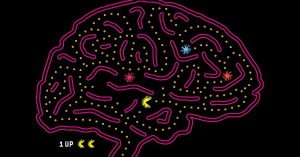Jeanette Winterson is a timeless writer. It’s not that her work transcends the ages—though it easily could—but rather that her novels are rarely bound by setting. Written on the Body feels fairly modern but, aside from its queer themes and learned discussion of cancer, is a love story that could have happened in any time. The Passion is set during the Napoleonic Wars of the early 19th century, but it also largely takes place in Venice, a city that always feels a thousand years old no matter how many people pull out iPhones in Piazza San Marco. Her more autobiographical works (Oranges Are Not the Only Fruit, Why Be Happy When You Could Be Normal?) take place during the mid-20th century of Winterson’s youth, but the themes of ostracization from one’s family are universal. Her ideas are ageless, even when her stories are not.
Nowhere is Winterson’s temporal fluidity more evident than in Frankissstein. Written as a fictionalized twist on Mary Shelley’s classic Frankenstein, her latest novel time-jumps from the early 1800s—when Shelley was writing her book on a trip with her husband, Percy Bysshe Shelley, as well as the poet Lord Byron, physician John William Polidori, and Mary’s stepsister, Claire—to a near-future where artificial intelligence and sexbots threaten to make Frankenstein‘s vision of invented life almost real. (If that Shelley story sounds familiar, it might be because it was the topic of a recent Manual Cinema production.) It straddles both worlds, and a few in between, and in so doing illustrates how human ideas of existence, identity, and emotional intelligence have changed radically—and not at all.
In Winterson’s world, the spirit of reanimation Shelley infused into her novel after losing a child gets reimagined in the person of Victor Stein (creative, no?), a 21st-century TED talker on the subject of artificial intelligence who is obsessed with re-creating the brain of I. J. “Jack” Good, the British mathematician who worked with Alan Turing at Bletchley Park. Stein’s occasional muse is Ry Shelley, a transgender transhumanist who also serves as the voice of reason. (Ry’s deadname is Mary—creative, no?) Their Claire is also named Claire (you get the point), but she’s now an Evangelical Christian slowly coming around to the idea that building AIs and sexbots isn’t somehow playing God. Ron is the maker of said sexbots (and probably the avatar of Byron) and Polidori is Polly D, an ambitious writer for Vanity Fair with some questionable journalistic practices. (I feel the need, here, to defend my Condé Nast floormates. They’re all very nice to me at the coffee machine and I’m pretty sure none of them would use the phrase “trans is hot right now.”)
Frankissstein by Jeanette Winterson | Buy on Amazon
Courtesy of Grove AtlanticTo avoid giving away too much—Frankissstein is, at its heart, a good read, and one best enjoyed cold—I’ll refrain from dissecting the plot further. But, as with so much of Winterson’s work, the most brilliant parts are in the connective tissue, the joints between themes and characters. Some of the ideas—if AI learns from us, it could end up as sexist as society itself—are ripped straight from the headlines. Others, like artificially intelligent sexbots, have been explored everywhere from Her to Lars and the Real Girl. But there is beauty in the way Winterson ties those concepts to notions of gender and identity and emotional intelligence. Byron treated women, and their thoughts, as inferior; his daughter, Ada Lovelace, preceded Turing in his work by decades. If the day comes when whole minds are uploaded into the cloud, what becomes of the identities we present in our corporeal forms? Reading, it’s difficult not to be reminded that the modern Victor Frankensteins—the AI geniuses, the Singularity evangelists—are often men, even though the creator of Frankenstein himself was a woman, and one who struggled for recognition in her time.
A note, on that point, about the feminism. Winterson has always been a practitioner of writing as different genders; the gender of Written on the Body‘s narrator is never revealed, and readers often don’t notice this until many chapters in; they just presume the person telling the story shares their identity. Unlike Written, which removed gender so that readers could evaluate the actions of the unnamed storyteller on their own merits, Frankissstein takes the genders of its protagonists very seriously, bringing questions of identity in the age of artificial intelligence strongly into focus. Written was beautiful because it left its era and characters up to interpretation; Frankissstein defines them outright—reminding its readers that the modern world’s search for facts erases the joy of mystery.
Do all of these concepts make a story? Mostly. It’s easy to savor the writing—brisk, romantic, sharp-humored—but at times the quest to make A Point can leave the novel feeling like a Franken-book, held together with crude twine. When it works, it works, but the whiplash can be a bit much. As with her novel The PowerBook, which also jumped around in time but also dates itself with talk of hard drives and meatspace, Winterson’s deft prose can feel ill-fitting when applied to modern language. So while it can lead to insightful observations like “Without language, or before language, the mind cannot comfort itself,” it can also lead to facepalm-y sentences like, “If we are reaching the end of Project Human, don’t blame the geeks.”
This is where Frankissstein struggles the most. Winterson is one of the better writers of the late 20th century, but it may be harder for her to succeed at being one of the best of the 21st. Years ago, writers who wanted their works to be considered literature avoided being labeled genre writers at all costs. Now Winterson, a master of literary fiction, has turned out the closest thing to science fiction she’s ever written. As someone at the forefront of challenging perceptions of gender in writing, she is now also looking to stay ahead. (And readers may question her authority, as a cis woman, to write a trans character.) Should she continue in genre fiction, the work will be stunning, but, as (modern) Stein tells (modern) Shelley, “the future always carries something from the past.”
Further Reading
-
Written on the Body by Jeanette Winterson
A better love story and more timeless tale than Winterson’s latest. It’s delicious from the beginning to the end. -
Alan Turing: The Enigma by Andrew Hodges
This is the book that inspired The Imitation Game. It’s a thorough recounting of Alan Turing’s genius—and the persecution he suffered for his homosexuality. -
Frankenstein by Mary Shelley
If you’re going to read Frankissstein, it’s in your best interest to also read the book that inspired it. Mary Shelley’s writing is as vivid today as it was 200 years ago. -
The Selected Poetry of Lord Byron by Lord Byron
If you’re looking for a hate-read after finishing Frankissstein, this might be a good place to start. Byron has earned his place in the poets pantheon, but he’s also kind of a cad. Check out some of his best works here. -
Ada’s Algorithm: How Lord Byron’s Daughter Ada Lovelace Launched the Digital Age by James Essinger
Most of what you need to know is in the title. But beyond that, Essinger’s book makes the argument that the computer age could’ve came much sooner than it did, if people would have just paid attention to what Lovelace was doing.
When you buy something using the retail links in our stories, we may earn a small affiliate commission. Read more about how this works.


